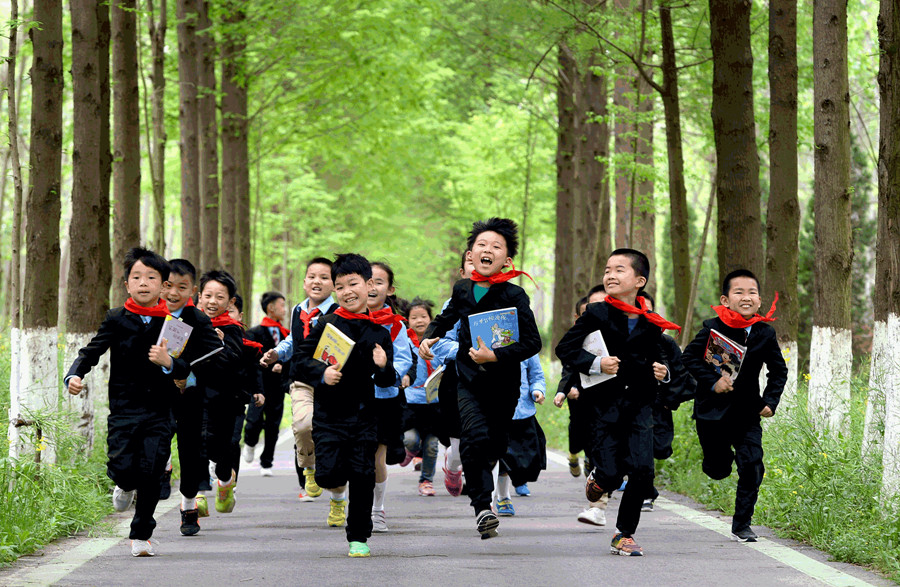Legislators look to boost Minors Protection Law

Primary school students play at Binhu National Forest Park, April 21, 2017. [Photo by ZHANG DAGANG/FOR CHINA DAILY]
Governments, parents, schools, service providers urged to act to keep kids safe
Lawmakers on Oct 21 sought to codify the protection of youngsters against cyber-based crimes and addictions as they work to revise the Minors Protection Law, a protective law for citizens under age 18.
The draft of the revised law was made public at the bimonthly session of the National People's Congress Standing Committee, which opened on Monday. It has been submitted to the top legislature for the first review.
In a new chapter named "Internet Protection", legislators began by giving a nod to minors' proper internet use, which in some cases has been denied by parents for fear that cyber engagement constitutes a distraction from academic activities.
The 11-clause chapter lays out duties for governments, schools, parents and digital service providers as to their responsibilities in navigating youngsters through cyberspace.
It demanded schools and parents offer proper education aimed at raising children's internet literacy and awareness for self-protection.
Libraries and other public service providers should install software to curb misuse of digital services, it said.
Developers were encouraged to roll out services tailored to children's needs and service providers were ordered to offer designs that will allow parents to monitor children's time and money spent on online platforms.
The chapter forbids threats, insults and attacks of minors in written, visual or audio forms and empowered parents and other guardians to demand service providers to remove such content.
It also required such platforms to create a channel for users to report breaches and set up a team to handle such reports.
With the rapid development of the internet and information technology, cyberspace has become a new environment for children's growth, which made it necessary to revise the law and add the new chapter, said He Yiting, an official from the NPC's Social Development Affairs Committee, while explaining the draft to lawmakers.
Experts hailed the revision as a major move in the country's internet governance that has extended protection of minors from the physical world to the online sphere.
Yuan Ningning, a children's law researcher at China University of Political Science and Law who was involved in the drafting process, said by laying out such rules in a separate chapter, the draft revision has put the protection of juveniles against online pornography, violence and bullying in a more prominent spotlight, which could have long-lasting social benefits.
"Juvenile offenses are highly correlated with improper internet use, with some data showing over 70 percent of underage offenders had access to improper information via the internet," he said, adding the draft has sent a strong signal that offenses in the digital space are punishable by law.
China has seen a rapid increase in the number of underage users over the last few years, as well as an epidemic of excessive smartphone use and online game addiction among juveniles, with rural children more vulnerable.
Figures from the China Internet Network Information Center show more than 79 million rural teenagers had access to the internet by the end of 2015.
Many of them are so-called left behind children who lack effective guardianship as their parents are away working in better-paying jobs in big cities.

Ministry of Justice of the
People's Republic of China
All rights reserved. Presented by China Daily.
京ICP备13016994号-2


